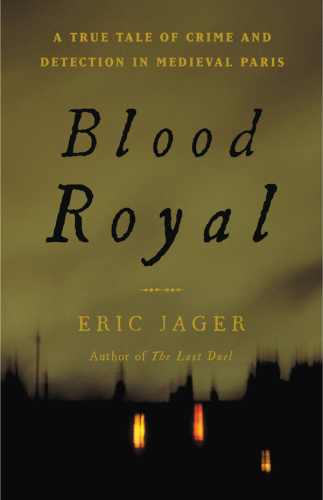
Blood Royal
A True Tale of Crime and Detection in Medieval Paris
کتاب های مرتبط
- اطلاعات
- نقد و بررسی
- دیدگاه کاربران
نقد و بررسی

January 27, 2014
UCLA professor and expert in medieval literature Jager (The Last Duel) examines the sensational assassination which rocked 15th Century France, as he explores the life, death, and legacy of Louis of Orleans. Drawing on extensive reports detailing the murder and its subsequent investigation, Jager reconstructs the chain of events, motives, and political squabbling that lit the spark. Though the story is ostensibly about the murder of Louis, brother to mad King Charles and frequent regent of France, it takes on a much larger scope as the uncovering of the mastermind leads to political maneuvering, civil war, and ultimately invasion by England. The purported hero of the piece, Guillaume de Tignonville, provost of Paris, quickly takes a backseat to royal infighting, brazen public manipulation, and outright treason, revealing the dark, unstable side to society of that era. Jager's attention to atmosphere and detail allows the setting to come to life in all its gruesome detail, especially as he explores the nature of crime and punishment and the many grisly repercussions for the those held responsible. Despite the misleading focus on Tignonville's investigation, this is a fascinating and complex look at the tumultuous events of early 15th century France. Agent: Glen Hartley and Lynn Chu, Writers' Representatives.

January 1, 2014
Few works of fiction will grab readers' attention as well as Jager's (The Last Duel: A True Story of Crime, Scandal, and Trial by Combat in Medieval France, 2004) riveting story of a 1407 murder mystery that split the royal family of France. When Louis of Orleans, brother and frequent regent of King Charles VI, was brutally murdered in a Paris street, the provost of Paris, Guillaume de Tignonville was under pressure to solve the crime quickly. He had just overseen the execution of two murderers, whose claim to the right of "clergy" would eventually come back to haunt him. Jager shares his extensive knowledge of medieval Paris, employing entertainingly meticulous descriptions throughout the book. The Chatelet, once a fortress, then a prison, morgue and police headquarters, was a vast building to be avoided at all costs, not unlike today's train stations. Montfaucon was a three-story gibbet capable of hanging 60 at a time, and bodies were left to putrefy and feed the crows and ravens. The author's portrayals of the perpetual stench and body parts will surely give readers shivers. De Tignonville's investigative techniques were exhaustive, and his discovery of the man behind the murder within days was spot-on. Accusing the suspect proved to be much more difficult, as he turned the accusation into a validation. Louis of Orleans was a broadly despised man, particularly by those men he had cuckolded (which were many), and he used his power as his schizophrenic brother's regent to impose impossible taxes. The murderer's justification for his dastardly deed was, as a leading scholar proclaimed, "one of the most insolent pieces of political chicanery and theological casuistry in all history." An impressive combination of mystery, crime story, and social and political history.
COPYRIGHT(2014) Kirkus Reviews, ALL RIGHTS RESERVED.

February 15, 2014
On a November evening in 1407, Louis of Orleans, brother of the mentally unbalanced French king Charles VI, was bludgeoned and stabbed to death on a Parisian street by several masked men. This was no simple street mugging. Louis had exercised great power during his brother's frequent bouts of incapacitation. With France still embroiled in the Hundred Years' War with England and facing severe internal threats to the monarchy, the murder had far-reaching implications. To unravel the assassination plot, Guillaume de Tigonville, the chief law enforcement officer of Paris, had to wade through the layers of criminality, corruption, and high politics that permeated different levels of French society. Jager has utilized de Tigonville's written report as the basis for a tense and exciting true-life detective story. De Tigonville is the ideal detective, combining street smarts, a relentless drive, and a willingness to follow where the facts lead regardless of whose toes he steps on. An outstanding crime tale that also provides a good survey of both the glittering facade and the seamier aspects of medieval Paris.(Reprinted with permission of Booklist, copyright 2014, American Library Association.)

























دیدگاه کاربران